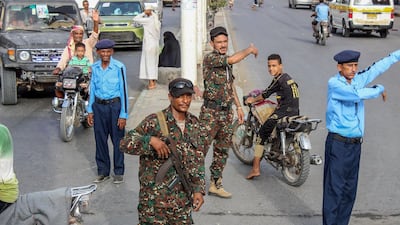International aid agencies are still facing challenges reaching desperately needed areas in Yemen’s rebel-held port city of Hodeidah, the Norwegian Refugee Council said on Wednesday.
The coastal city is home to Yemen’s most valuable port, crucial for nearly 80 per cent of aid deliveries, food and fuel imports in the war-torn country.
"There are continued restrictions on commercial goods at Hodeidah port which blocks and delays goods from getting into the country and pushes up the price and availability of food, fuel and medicines," NRC's advocacy manager, Sultana Begum, told The National.
Restrictions on the movement of goods and staff are the biggest hurdles facing humanitarian agencies in Yemen, she said.
The port city is under the rebels' control while Yemeni forces aligned with the government wait on its outskirts.
Humanitarian supplies can be held at ports and checkpoints for months due to "bureaucratic obstacles", Ms Begum said.
“These obstructions make it difficult for NRC and other aid agencies to ensure people are getting the right type of help they need, ensuring the most vulnerable are helped, and monitoring to ensure aid is reaching the people it was intended for."
“Yemen is closer to famine than ever before and cholera outbreak could have deadly consequences if assistance does not get to people in time,” she warned.
The actions of the Houthi rebels make it difficult to provide lifesaving assistance to those who are in desperate need of aid.
More than 24 million Yemenis, who make up 80 per cent of the population, now need some form of humanitarian aid or protection, and as many as half could face starvation if aid agencies don’t reach them with food and other assistance, NRC said.
Many areas in the country are on the verge of being declared famine zones and the United Nations has called the situation the worst humanitarian disaster in the world.
The UN food agency (WFP) echoed Ms Begum’s statement last month by threatening to suspend aid to Houthi-held areas because of the “obstructive and un-co-operative” stance by the rebels.
Houthi officials have interfered with food distribution and have denied access to humanitarian workers to areas that are most in need of assistance, the agency said in a statement.
“If we are not given the access and freedom to decide who gets this vital assistance, then we will have to take the hard decision of implementing a phased suspension of our operations in Houthi-controlled areas,” spokesman Herve Verhoosel said.
The agency accused the rebels of diverting food deliveries, after photo evidence collected by the agency showed trucks illicitly removing food from designated food distribution centres.
The programme's monitors also found that rebels were manipulating lists of aid recipients.
“Some food relief is being given to people not entitled to it and some is being sold for gain in the markets of the capital,” they said.
WFP is attempting to feed about 12 million of Yemen's most vulnerable – nearly half of the population – at a cost to the international community about $175 million (Dh643m) a month.


